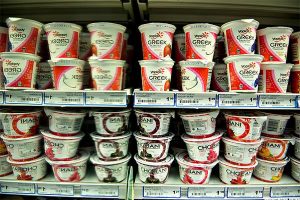 General Mills Inc posted sales that fell 7% during its most recent quarter, ending the three-month period at $3.9 million, due to a plunge in the United States of its Yoplait yogurt business as shoppers shift to brands that are Greek-style.
General Mills Inc posted sales that fell 7% during its most recent quarter, ending the three-month period at $3.9 million, due to a plunge in the United States of its Yoplait yogurt business as shoppers shift to brands that are Greek-style.
General Mills, based in Minneapolis, has been struggling to keep abreast of the rapidly changing habits of eating of its customers, which have hurt brands like Cheerios cereal and cake mixes such as Betty Crocker.
CEO Ken Powell recently prioritized the revamping of the cereal business in the U.S., by eliminating their gluten or artificial colors and adding in protein to entice customers back.
The company is expecting its sales trends to improve during the last quarter of the calendar year and profit for General Mills for the just ended quarter was actually higher than had been expected by analysts.
One industry analyst said that by switching to trendier and simpler ingredients helped General Mills, but reviving its yogurt and cereal brands will take some time in the highly competitive categories. Investors might lack the patience to sit and see if the company is successful, added the analyst.
Shoppers in the U.S. are purchasing more yogurt that is Greek-style, which has additional protein and not as much sugar, as well as organic varieties that do not use any artificial sweeteners.
There is no strong brand recognition for General Mills in those products, instead, its brand of Yoplait Light is supported by those who like low-cal diets and snacks that are 100 calories that are no longer in style.
General Mills has added more organic yogurt varieties through its Annie’s Homegrown line that it purchased in 2014 and is planning a new line of products that includes yogurt snacks and drinks that are in different containers than the typical yogurt cup.
General Mills’ overhaul of its cereal appears to have worked, with retail sales of different cereals that do not have artificial flavors or colors up over 3% in the most recent quarter across the U.S.
Excluding its sale of the vegetable brand Green Giant and other products that have an effect on comparability, sales dropped 4% across the globe during the quarter that ended during August.
Retail sales in General Mills for the U.S. were down 8% to just over $2.33 billion including a drop of 5% in its comparable sales.
